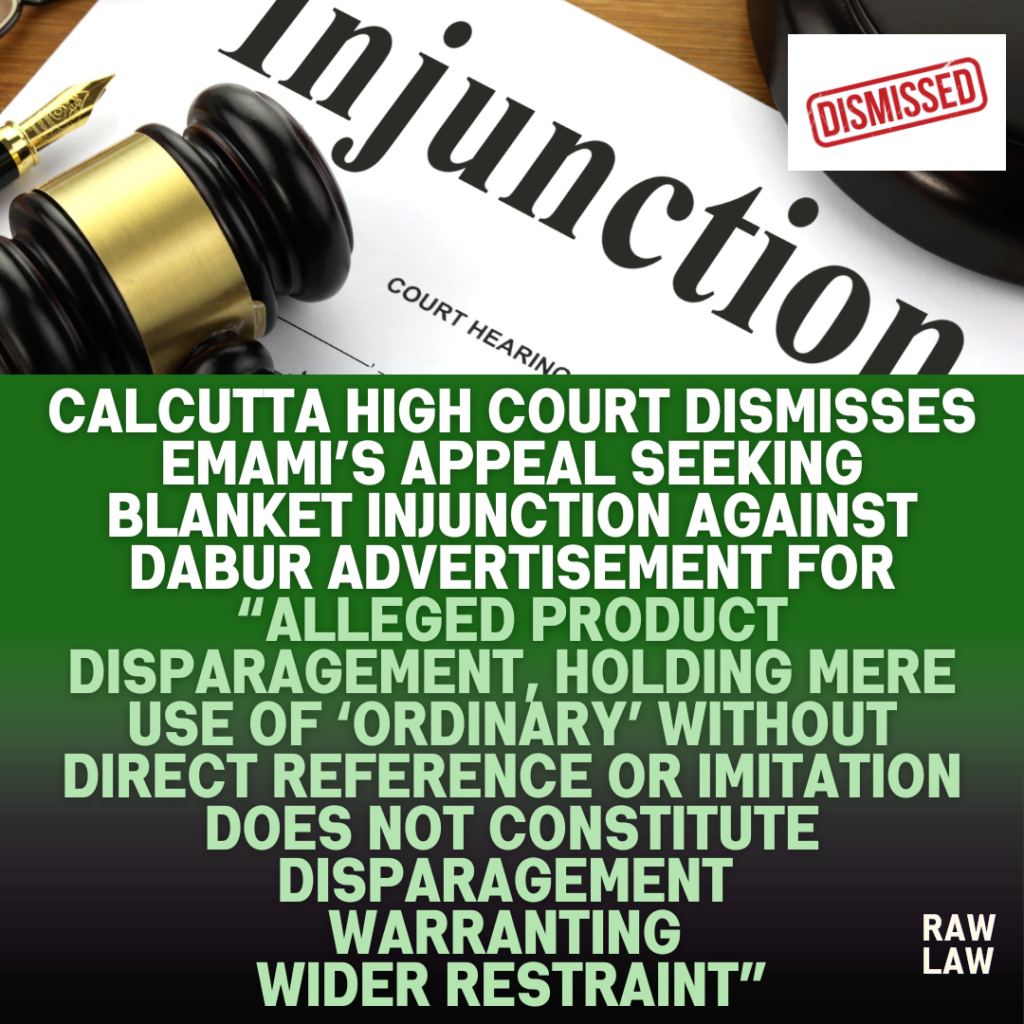Court’s Decision
The Calcutta High Court dismissed Emami’s appeal seeking a broader injunction against Dabur’s advertisement for its “Cool King” product, holding that the advertisement did not prima facie disparage Emami’s “Dermi Cool” and “Navratna” products merely by using the word “Sadharan” (ordinary). The modified interim order passed by the single judge restraining the specific advertisement was upheld, and Emami’s request for a dynamic blanket injunction was rejected.
Facts
Emami filed a suit alleging disparagement of its popular products “Dermi Cool” and “Navratna” in Dabur’s advertisement for “Cool King”, claiming the bottle depicted resembled its product and was labelled “Sadharan” (ordinary), implying inferiority and harming its market goodwill. The single judge initially passed an ad-interim injunction restraining Dabur from airing the advertisement showing Emami’s bottles, which was later modified to restrain the entire advertisement. Emami challenged this modified order seeking a wider injunction.
Issues
- Whether the depiction of a bottle allegedly resembling Emami’s product and labelling it “ordinary” amounted to actionable disparagement.
- Whether the modified injunction restraining the specific advertisement sufficed or whether a wider injunction was justified.
- Whether the alleged similarity and use of “ordinary” created a recall value in consumers’ minds causing disparagement.
Petitioner’s Arguments
Emami argued that Dabur’s advertisement, using a popular actor and depicting a bottle resembling Emami’s products while labelling it “Sadharan”, harmed Emami’s goodwill and led consumers to associate its products with inferiority. It cited Pepsi Co. v. Hindustan Coca Cola, Dabur India v. Colgate, Gillette India v. Reckitt Benckiser, and Hindustan Unilever v. Reckitt Benckiser to argue that visual and implied disparagement in comparative advertising is actionable and warrants injunctive relief. It claimed the advertisement’s recall value remained high despite the time gap.
Respondent’s Arguments
Dabur argued that the bottle depicted was different from Emami’s, lacking the tapering shape and green notched cap, using a cylindrical bottle with a black cap, making the resemblance argument baseless. Dabur contended that the term “Sadharan” was used generically, not derogatorily, and the absence of direct reference to Emami’s products negated disparagement. It further argued that comparative advertising is permissible under free commercial speech, and the modified injunction adequately protected Emami, making a broader injunction unwarranted.
Analysis of the Law
The court examined the principles governing comparative advertising and disparagement, reiterating that an advertiser may claim its product is superior but cannot denigrate competitors’ products directly or indirectly. It analysed Article 19(1)(a) rights of commercial free speech, balancing it against reputational rights. The court emphasized that for disparagement, there must be direct or implied denigration, bordering on defamation, beyond mere puffery.
Precedent Analysis
The court relied on:
- Reckitt & Colman of India Ltd. v. MP Ramchandran (1999) 19 PTC 741: Advertisers can claim superiority without disparaging competitors.
- Dabur India Ltd. v. Emami Ltd. (2019 SCC OnLine Del 9022): Comparative claims permissible unless they cross into denigration.
- Hindustan Unilever Ltd. v. Emami Ltd. (2019 SCC OnLine Del 7809): Similarity judged from an average consumer’s perception, requiring clear denigration for injunction.
- Pepsi Co. v. Hindustan Coca Cola (2003 SCC OnLine Del 802): Direct or indirect references constituting disparagement are actionable.
- Gillette India Ltd. v. Reckitt Benckiser (2018 SCC OnLine Mad 1126): Disparagement requires derogation or denigration, not mere comparison.
These judgments guided the court to conclude that there was no actionable disparagement in Dabur’s advertisement.
Court’s Reasoning
The court found the bottles in the advertisement and Emami’s products were visibly different to an average consumer with imperfect recollection. It noted that a six-month gap between the initial and modified injunctions diluted the recall argument. The word “Sadharan” was used generically without implying inferiority, and there was no direct or indirect reference to Emami’s products, unlike in Pepsi Co. The court emphasized that an injunction against all future advertisements would stifle competition and commercial speech and would be impractical, while the modified interim injunction sufficed to protect Emami’s interests.
Conclusion
The appeal was dismissed, confirming the modified interim injunction restraining the impugned advertisement, while rejecting Emami’s request for a wider, dynamic injunction. Interim orders were vacated, and the parties were permitted to contest merits during trial proceedings.
Implications
This judgment reinforces:
- Comparative advertising without direct or implied disparagement is protected under commercial free speech.
- Mere use of terms like “ordinary” without direct reference or imitation does not constitute disparagement.
- Blanket injunctions stifling future advertisements are disfavoured, ensuring competition and consumer choice.
Short notes on cases referred and relevance
- Reckitt & Colman: Advertisers may claim superiority but cannot disparage competitors.
- Dabur v. Emami & HUL v. Emami: Similarity and disparagement require clear, perceptible linkage.
- Pepsi Co. v. HCCL: Direct and indirect references creating disparagement are actionable.
- Gillette v. Reckitt: Disparagement must amount to derogation, not mere comparison.
These precedents guided the court to uphold Dabur’s right to comparative advertising without granting Emami a broader injunction.
FAQs
1. Can a company claim disparagement if an advertisement calls a competing product ‘ordinary’?
Not unless it is directly linked to the company’s product or implies inferiority, mere generic use is insufficient for disparagement claims.
2. Are comparative advertisements allowed under Indian law?
Yes, as long as they do not denigrate competitors’ products and stay within the bounds of fair competition and free commercial speech.
3. Can courts issue blanket injunctions against future advertisements in disputes of disparagement?
No, courts avoid blanket injunctions and evaluate each advertisement for disparagement based on its specific content and context.
